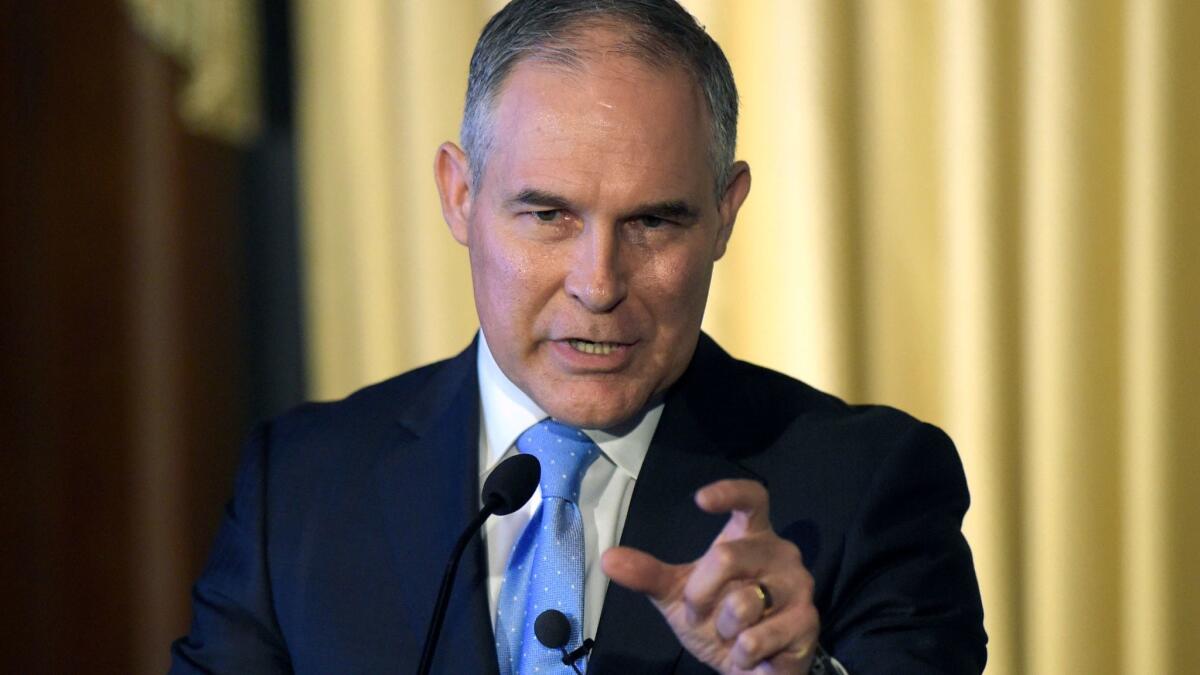Editorial: Even our Republican Congress should be able to recognize the danger Scott Pruitt poses

- Share via
The Environmental Protection Agency was supposed to announce by Oct. 1 which parts of the country had fallen short of new, more stringent limits on the amount of ozone in the air, thus clearing the way for local action to reduce emissions. But the EPA failed to issue the designations, sparking a lawsuit last week by California and more than a dozen other states asking a federal judge in Washington, D.C., to force the government to, in essence, do its job.
This is no mere kerfuffle over obscure regulatory matters; the ozone level designation is the foundation upon which the California Air Resources Board and other agencies reduce smog in Los Angeles, the Central Valley and elsewhere, potentially saving the lives of hundreds — if not thousands — of people, reducing hospital emergency room visits for asthma and other smog-related illnesses and generally improving the quality of life for Californians.
Unfortunately, blowing by its own deadline was not an unavoidable, one-off mistake on the part of Scott Pruitt’s EPA. A recent report by the New York Times suggests that under Pruitt, who as Oklahoma attorney general filed more than a dozen suits to undermine the very agency he now runs, the EPA seems to be distancing itself from the “protection” part of its name. In Pruitt’s first nine months, the agency initiated about 1,900 cases against suspected polluters, a third less than the number brought in the same time frame under the Obama administration, and 25% less than were brought by George W. Bush’s EPA. It also has levied much lower fines than the previous two administrations, and it took the unusual step of ordering regional offices to get permission from Washington before seeking water and air pollution tests from factories and other polluters, a key first step in deciding whether to begin an enforcement action.
The EPA’s retrenchment is a scandal, a disaster waiting to happen.
At the same time, more than 700 employees have left the agency, many bought out as part of an initiative to reduce the EPA’s payroll (the EPA denies unconvincingly that it has let up on enforcement). And Pruitt has moved to end an agreement under which the EPA reimburses the Justice Department for investigations into Superfund sites which critics say will reduce enforcement efforts there as well. More broadly, the Trump administration has moved to undo more than 50 environmental regulations under the EPA, the Bureau of Land Management and other agencies.
The agency’s retrenchment is a scandal, a disaster waiting to happen. Environmental protection is not a Democratic or Republican project, but a bipartisan promise that has been made to all Americans. It must not be sacrificed for short-term gain or to benefit particular special interest groups.
And who is expected to pick up the slack if the U.S. government backs off? Pruitt, who has a cozy history with the industries he’s supposed to regulate, has begun turning over more enforcement responsibility to state environmental regulators, a unilateral action that does not bode well for the future. Even large pro-environment states like California rely on the EPA for muscle, and large portions of state regulators’ budgets come from the EPA, funding that President Trump also wants to slash.
And state regulation has other limitations: Air and water pollution generally do not stay where they were created, and one of the EPA’s key roles is to ensure that one state’s lax approach to environmental protection does not endanger people in other states downwind or downstream. Letting state regulators make more decisions about who is and isn’t polluting makes it less likely that bad actors will be held accountable, especially in polluter-friendly states such as Texas, which brags about its low-regulation approach as a selling point to entice economic development.
In fact, it was the ineffectiveness of state environmental laws that led to the creation of the EPA in 1970. It has the responsibility to enforce the revamped Clean Air Act of 1970 and the Clean Water Act of 1972, two fundamental laws regulating air and water pollution.
It’s true that not all regulations are smart regulations, and some can lead to unintended consequences. Sometimes they need revamping; sometimes they need to be withdrawn. But administrative processes exist to do that in ways that ensure changes are in the public interest. Pruitt’s gutting of the EPA and his retreat from enforcing existing rules undercuts the regulatory process, and endangers the environment and public health. No wonder environmentalists keep suing — and winning — over these inane moves. There can be a balance between environmental protection and business interests, but it’s foolish to risk long-term harm to the ecosystems that sustain us for the sake of often short-term jobs.
Follow the Opinion section on Twitter @latimesopinion or Facebook
More to Read
A cure for the common opinion
Get thought-provoking perspectives with our weekly newsletter.
You may occasionally receive promotional content from the Los Angeles Times.






